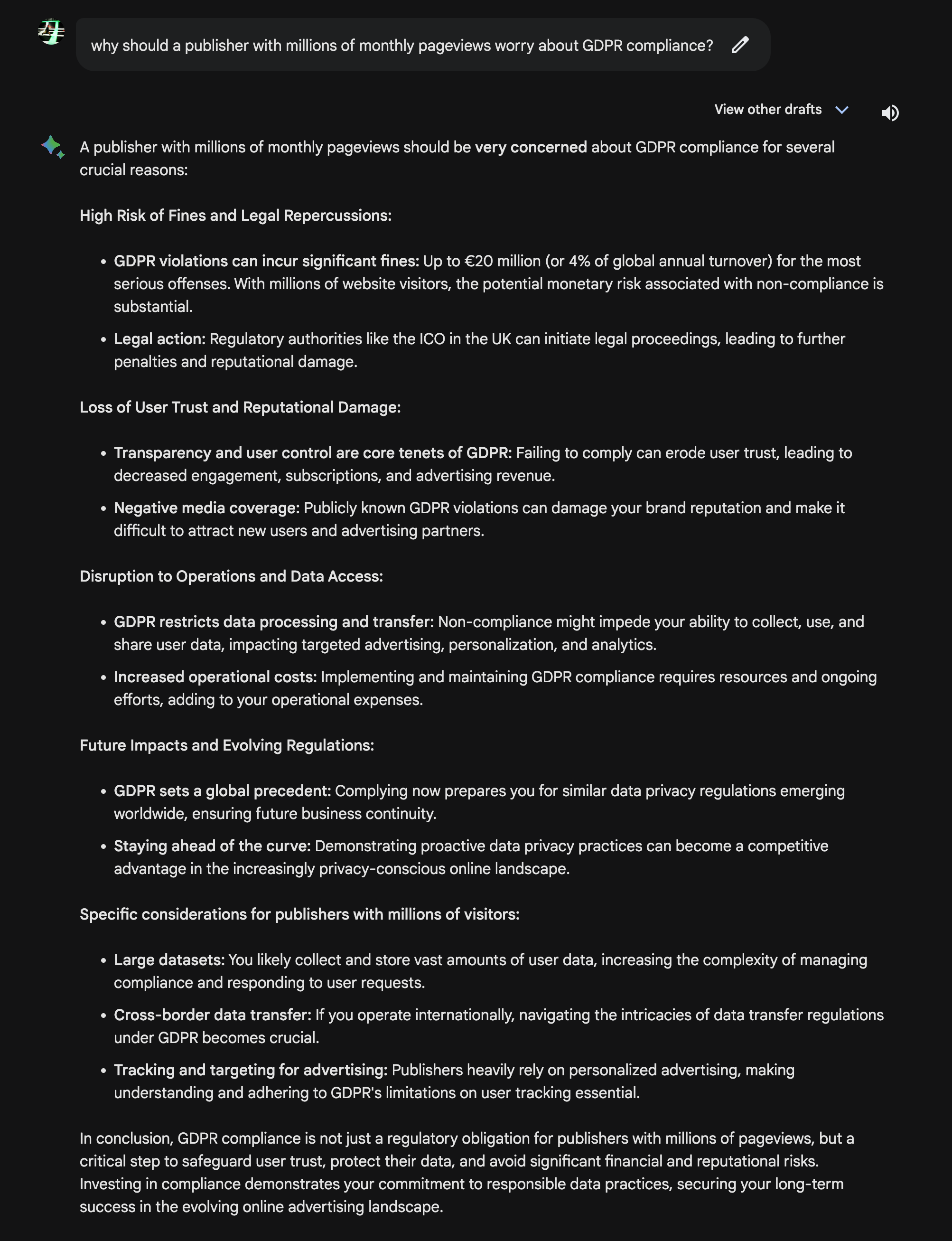Share this
What Is GDPR Compliance and Why Does It Matter?
by Organic Team on Jan 16, 2024 5:46:36 PM
Let's take a look at the practical importance of GDPR compliance for high traffic websites, and why it impacts the processes website operators should implement to correctly keep data and IP safe and secure.

Oh AI image generator, yes your invented image for "GDPR compliance" made me chuckle, again.
Understanding GDPR: A Brief Overview of where we all stand
The General Data Protection Regulation (GDPR) is a comprehensive data protection law that was implemented by the European Union (EU) in 2018. Its primary goal is to protect the personal data and privacy of EU citizens.
GDPR applies to all organizations that process or store personal data of individuals within the EU, regardless of the organization's location. It sets out strict requirements for how personal data should be handled, stored, and protected.
The GDPR regulation introduces several key principles that organizations and high traffic websites must adhere to in order to achieve compliance. The fundamental guiding principles include transparency, lawfulness, fairness, purpose limitation, data minimization, accuracy, storage limitation, integrity and confidentiality, and accountability.
SaaS providers such as Organic.ly can manage GDPR compliance for any publisher. In our estimation, there's significant value to reap in outsourcing these technical particularities to a provider like Organic rather than doing it yourself.
The Key Principles of GDPR Compliance
Transparency: Organizations must be transparent about how they collect, use, and process personal data.
Lawfulness: Organizations must have a legal basis for processing personal data and must obtain consent from individuals when necessary.
Fairness: Personal data must be processed in a fair and lawful manner.
Purpose Limitation: Personal data should only be collected and processed for specific, explicit, and legitimate purposes.
Data Minimization: Organizations should only collect and store the minimum amount of personal data necessary for the intended purpose.
Accuracy: Personal data should be accurate and kept up to date.
Storage Limitation: Personal data should not be kept for longer than necessary.
Integrity and Confidentiality: Personal data should be processed in a secure manner to ensure its confidentiality and integrity.
Accountability: Organizations are responsible for complying with the principles of the GDPR and must be able to demonstrate compliance.
Why GDPR Compliance Matters for High Traffic Websites
GDPR compliance is crucial for high traffic websites because it ensures that website operators can build trust with their audience of users — i.e. by protecting their audience's personal information so that it's used only with consent to enhance one's experience.
By complying with the GDPR, website operators show their commitment to data protection and privacy, which enhances their online reputation and attracts more users. Non-compliance with GDPR, on the other hand, will result in severe penalties, including fines of up to 4% of your global annual turnover (or €20 million pounds, whichever is higher).
Furthermore, GDPR applies to any organization that processes or stores personal data of EU citizens, regardless of the organization's location. This means that even if your high traffic website is based outside of the EU, you may still be subject to the GDPR standards. Thus, it is essential to understand and comply with GDPR to avoid legal consequences, especially as this regulation gets used as a template for other countries.

AI coldly articulates necessity here — as usual lol
Steps to Achieve GDPR Compliance
To achieve GDPR compliance for a high traffic website, you should consider the following steps:
1. Understand the GDPR requirements: Familiarize yourself with the key principles and requirements of the GDPR to ensure you have a clear understanding of what is expected.
2. Conduct a data audit: Identify and document all the personal data you collect, process, and store on your website. Determine the legal basis for processing each type of data and assess if you have the necessary consent.
3. Update your privacy policy: Make sure your privacy policy is clear, transparent, and includes all the required information as per the GDPR.
4. Implement data protection measures: Put in place appropriate technical and organizational measures to protect the personal data you collect. This may include encryption, access controls, and regular data backups.
5. Obtain consent: If you rely on user consent to process personal data, ensure that you have a valid and documented consent mechanism in place. Obtain explicit consent for sensitive data.
6. Provide data subject rights: Enable individuals to exercise their rights under the GDPR, such as the right to access, rectify, and erase their personal data.
7. Train your staff: Educate your employees about the GDPR and their responsibilities in handling personal data. Implement procedures to handle data breaches and ensure prompt reporting if a breach occurs.
8. Regularly review and update your compliance: GDPR compliance is an ongoing process. Regularly review and update your data protection practices to ensure continued compliance.
Maintaining GDPR Compliance: Best Practices
To maintain GDPR compliance for your website, consider the following best practices:
1. Stay informed about regulatory updates: Keep track of any changes or updates to the GDPR and other relevant data protection regulations.
2. Conduct regular data audits: Continuously monitor and review the personal data you collect and process to ensure compliance.
3. Keep your privacy policy up to date: Regularly review and update your privacy policy to reflect any changes in your data processing practices or legal requirements.
4. Implement privacy by design: Incorporate privacy considerations into the design phase of your website and any new features or services you introduce.
5. Train your employees: Provide regular training sessions to your staff to ensure they understand their obligations and responsibilities under the GDPR.
6. Respond to data subject requests promptly: Promptly respond to data subject requests, such as access or erasure requests, in accordance with the GDPR's timelines and requirements.
7. Regularly review and update your data protection measures: Stay up to date with the latest security practices and technologies to protect the personal data you collect.
8. Conduct regular risk assessments: Identify and mitigate any potential risks to the security of the personal data you process.
By following these best practices, you can ensure that your website maintains GDPR compliance and protects the personal data of your users.
-----
More questions about GDPR, CCPA, or other types of data compliance. We'd love to help you out: sales@organic.ly.
Share this
- June 2024 (2)
- May 2024 (3)
- April 2024 (1)
- March 2024 (4)
- February 2024 (1)
- January 2024 (11)
- December 2023 (1)
- November 2023 (2)
- October 2023 (3)
- September 2023 (3)
- August 2023 (4)
- June 2023 (1)
- May 2023 (3)
- March 2023 (4)
- February 2023 (5)
- January 2023 (3)
- December 2022 (1)
- November 2022 (2)
- October 2022 (2)
- September 2022 (1)